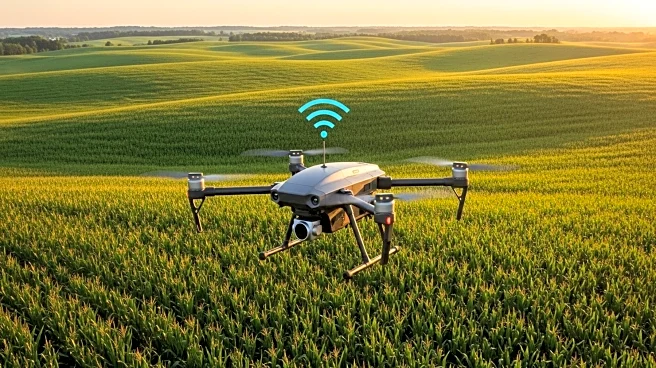What's Happening?
Iowa farmers are facing a 'data deluge' due to the vast amount of information generated by modern precision agriculture techniques. This includes data points from soil type, row width, irrigation practices, seasonal pests, and weather patterns. To help farmers manage this influx of data, agricultural organizations and researchers are turning to artificial intelligence (AI). At the Iowa Ideas conference, experts discussed how AI can provide actionable insights to improve profitability, yield outcomes, and plant genomics. Baskar Ganapathysubramanian from Iowa State University highlighted the potential of AI in transforming agriculture through technologies like drones, satellite data, and sensors. The panel also included Karlene Negus, who is working on AI models for plant breeding, and Matthew Carroll from the Iowa Soybean Association, who emphasized the importance of trust and partnerships in encouraging farmers to adopt AI tools.
Why It's Important?
The integration of AI in agriculture is significant as it offers solutions to manage the overwhelming amount of data farmers face, potentially leading to more efficient farming practices and improved crop yields. AI tools like InsectNet, which identifies insect species with high accuracy, can help farmers make informed decisions about pest management. However, the adoption of AI in agriculture is challenged by data privacy concerns and the need for trust between farmers and organizations. Building strong relationships and ensuring data security are crucial for wider acceptance of AI technologies. The successful implementation of AI could lead to advancements in plant breeding, reducing the time required to develop new crop varieties, and ultimately enhancing food security.
What's Next?
Future steps involve addressing data privacy and security concerns to encourage more farmers to share their data. Solutions like federated learning, which offers privacy protections by not requiring data to be uploaded to a centralized server, could be explored. Additionally, fostering trust and partnerships between farmers and agricultural organizations will be key to increasing AI adoption. As AI technologies continue to evolve, ongoing research and development will be necessary to refine these tools and expand their applications in agriculture.
Beyond the Headlines
The ethical implications of AI in agriculture include ensuring equitable access to technology and preventing monopolization by large corporations. There is also a need to establish regulatory frameworks for data collection and sharing to protect farmers' interests. Long-term, AI could lead to shifts in agricultural practices, potentially reducing the environmental impact of farming through more precise resource management.











